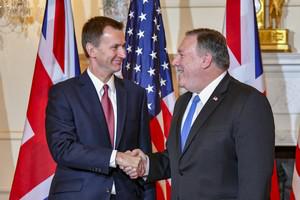The Russia connectionDeterrence in the cyber age: U.K. Foreign Secretary's speech
U.K. foreign secretary Jeremy Hunt last Thursday spoke at Glasgow University on cybersecurity and the U.K. government’s approach to deterring cybercrime. “In the cyber age, an authoritarian regime armed with nothing more ambitious than a laptop computer could try to manipulate our democracy, Hunt said. “For every example of publicly attributed interference [by Russia], there have been others that never saw the light of day.” He added: “The material fact is that the Russian state has tried to subvert democracy,” concluding: “We can no longer afford to wait until an authoritarian regime demonstrably succeeds in changing the outcome of an election and weakening trust in the integrity of democracy itself. The risk is that after just a few cases, a pall of suspicion would descend over a democratic process – and once that happens, the damage would be difficult, perhaps impossible, to repair.”

U.K. Foreign Secretary Jeremy Hunt with U.S. Secretary of State Mike Pompeo // Source: flickr.com
U.K. foreign secretary Jeremy Hunt last Thursday spoke at Glasgow University on cybersecurity and the U.K. government’s approach to deterring cybercrime.
I’m delighted to be here at Glasgow University.
For centuries, this City and its University have been at the forefront of science, technology and medicine. The modern disciplines of physics and economics – and the Industrial Revolution itself - find their origins here. There could be no better setting for a speech about the challenges presented by the advance of new technology.
Just occasionally, even a Conservative Foreign Secretary should break with tradition, so I propose to begin by quoting the late Tony Benn.
In his book Arguments for Democracy, Benn wrote: “If one meets a powerful person ask them five questions: “What power have you got? Where did you get it from? In whose interests do you exercise it? To whom are you accountable? And how can we get rid of you’?”
And the final question is by far the most salient.
“If you cannot get rid of the people who govern you,” Benn wrote, “you do not live in a democratic system”. And he was right, of course.
The freedom to pass judgement on your leaders and change your government peacefully, through the ballot box, is the defining quality of a liberal democracy.
Millions of people have made immense sacrifices for the sake of that essential liberty.
Exactly 3 decades ago, the year 1989 saw the fastest advance of liberal democracy in history.
On 4th June, a free election in Poland triggered the fall of the Iron Curtain.
Within a decade, another 16 countries had broken the chains of dictatorship.
But what the Poles, Czechs and many others did not have to contend with in 1989 was the reality of cyber technology, a hugely powerful force for openness and transparency, but one that also possesses a dark side, capable of being used to subvert the very democratic processes we hold dear.
